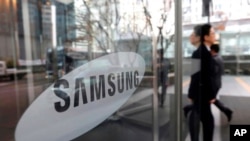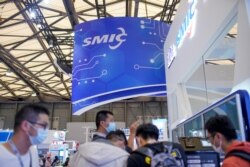South Korea’s leading role in high-tech industries has made it an attractive target for fast-rising Chinese rivals in search of enhanced capabilities in semiconductors, computer displays and shipbuilding, among other technologies.
The methods employed by China run the gamut, from relatively benign attempts to recruit skilled workers to more nefarious practices, including bribing South Koreans to divulge trade secrets and illegally hacking into company computer systems.
The recruitment efforts often are highly alluring. South Korean job-search websites are filled with ads from Chinese companies with language such as “living expenses and children’s education provided,” or “two-year contract with competitive salary and bonus.”
“Basically, your annual salary will double,” explained a businessman with a South Korean semiconductor firm, who travels frequently between Beijing and Seoul, and who asked not to be identified for reasons of personal safety.
“For example, there’s not enough talent in circuit board design in China. So, they will post a recruiting ad offering a two-year contract, with twice the salary of an average designer in South Korea. Housing and education for kids will be covered, too.”
Two-year limit
The businessman said the Chinese firms generally limit their job offers to two-year contracts. “After they’ve learned everything, they will end the contract and look for other talents they need.”
Japan’s Nikkei financial news organization has reported that Chinese display maker BOE, which has been vying for Apple’s iPhone business for years, has hired about 120 South Koreans. These include more than 50 former Samsung engineers who led the development of OLED screens for the iPhone.
Nikkei also reported that at least 62 South Korean names appeared in the patents filed by China’s Semiconductor Manufacturing International Corporation (SMIC), which is on a U.S. government blacklist.
Park Wonhyeong, a professor in the Department of Information Security Engineering at Sangmyung University in Seoul, told VOA that headhunting is just one of the ways China acquires advanced technology from South Korea.
“In many cases, Chinese companies are purchasing trade secrets or industrial technologies directly from employees in major South Korean companies,” he said.
Corporate espionage is a major concern for leading South Korean companies. This month, two former Samsung employees were sentenced to two years in prison for trying to leak Samsung’s OLED secrets to China in violation of the industrial technology protection law.
Samsung secrets
Samsung, a leading maker of smartphones, TV displays, semiconductors and home appliances, had revenue of nearly $60 billion in 2020. Ensuring Samsung’s continued success and protecting its trade secrets is a matter of national importance for Seoul.
Even more concerning, Park said, is a concerted drive by Chinese hackers to steal trade secrets by attacking the internal systems of Korean companies. He said the Chinese hackers are good at finding loopholes in the corporate systems through search engines such as SHODAN, which let the user find specific types of computers connected to the internet using a variety of filters.
Park said the attacks can be reliably traced to Chinese hackers from the malicious code that is used.
“But why would they target things like customer service that is not key to trade secrets?” he asked. “It’s because they want to penetrate into a company’s internal system through a less guarded department, and then attack the headquarters, which usually has stronger security measures.”
He said there is evidence that some of these hackers are members of China’s People’s Liberation Army or otherwise linked to the Beijing government.
South Korea’s National Intelligence Service has identified 123 technology leaks from South Korea from 2015 to 2019, including 83 leaks that went to China. Many of the leaks involved technologies where South Korean companies have a lead on competitors.
Harsher penalties
In response, the Seoul government has toughened penalties for technology leaks and has listed high-tech trade secrets as “national core technologies.”
Companies like Samsung also have increased security practices to prevent employees from stealing sensitive data.
Samsung requires employees to disable cameras and audio-recording functions of their smartphones before entering its labs and factories. And at some labs, the company uses paper embedded with metal foil to activate sensors if employees try to remove documents without permission.
Lin Yang contributed to this report.













